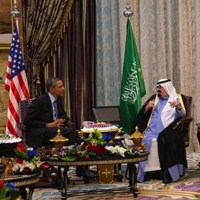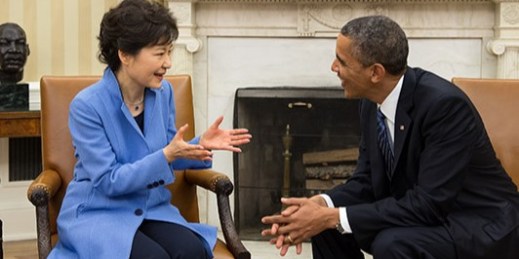On Sunday, Turkey’s ruling Justice and Development Party (AKP) under Prime Minister Recep Tayyip Erdogan racked up an astounding victory in municipal elections. The party’s success came despite waves of civil unrest last year, the economy taking a downturn, daily revelations about corruption in the highest echelons of government and a crackdown on online media. There are many political and socio-economic reasons for the AKP’s dominance, but in Turkey’s Kurdish southeast, Erdogan was able to count on one unexpected campaigner on his behalf: the president of the Kurdish autonomous region in Iraq, Massoud Barzani. On Nov. 18, facing his darkest […]
Latest Archive
Free Newsletter

When President Barack Obama arrived in Saudi Arabia last Friday, he briefly opened a window into the closest circles of power in Riyadh. One of the most striking images was that of Saudi King Abdullah breathing with the aid of an oxygen tank during his meeting with Obama. Although the king appeared animated and energetic, still sporting the jet-black goatee popular among Saudi royals, he looked puffy, and the plastic tubes taking oxygen into his nose betrayed the urgency of a royal succession process that has already gone into overdrive. It was no coincidence that Thursday, the day before Obama […]

The European Union has at last proposed what it calls the “second pillar” of its banking union. The first pillar, unveiled last December, consists of proposals for banking reform, aimed at reducing risk in the financial system. This next step proposes a mechanism should those reforms fail and the authorities have to deal with bank failures. Some, including Michael Barnier, the EU commissioner in charge of regulation, have referred to this proposed Single Resolution Mechanism (SRM) as a “revolution” on a par with the adoption of the euro. That characterization surely overstates, as does use of the word “pillar.” Matters […]

In late February, Ecuador’s municipal elections yielded gains for the opposition in an apparent setback for President Rafael Correa. In an email interview, Michael Shifter, president of the Inter-American Dialogue and adjunct professor of Latin American politics at Georgetown University’s School of Foreign Service, explained why the opposition made gains and what’s next for Correa. WPR: What factors were involved with the Ecuadorean opposition’s victory in municipal elections in February? Michael Shifter: The Ecuadorean opposition’s victory in municipal elections on Feb. 23 was a sharp rebuke to President Rafael Correa, who campaigned heavily and effectively nationalized the vote. The results […]

The new foreign investment law passed unanimously last Saturday by Cuba’s National Assembly is a key component of President Raul Castro’s program to “update” the economy. Castro deemed the law so important that he called the assembly into special session to pass it rather than wait for the regularly scheduled session in July. The new law offers significantly better terms to foreign investors than the 1995 law it replaces, with the aim of boosting direct foreign investment (FDI) in Cuba’s chronically capital-poor economy. Though Cuba’s internal sector reforms have garnered more attention, it was a crisis in the external sector […]

Everyone knows that the United States needs to shrink its defense budget and national security organization; the challenge is doing so intelligently. Without attention to the long-term effects of the downsizing, the rush to cut could stifle creativity and fail to cultivate strategic visionaries. The net effect would be pawning America’s future security to make today’s budget. Fostering creativity is not easy for an immense, ponderous bureaucracy even in the best of times. This is particularly true for the national security organization, which instinctively leans toward risk aversion, cautious consensus-building and a focus on the short term. Senior officials know […]

The South Korean and U.S. militaries have begun their annual major field training exercise, “Foal Eagle,” which will last until April 18. It includes the largest amphibious drill in Korea in decades, a 12-day operation code-named Ssan Yong, or “Twin Dragons,” that will involve some 15,000 South Korean and 10,000 U.S. soldiers. South Korean military personnel approvingly told the media that the Ssan Yong amphibious landings underscore their country’s strategic significance to the Obama administration’s Asia rebalancing policy. Beneath the surface calm, however, many troubled currents will buffet both the amphibious exercise and the overall bilateral military relationship. Unlike in […]
The Obama administration faces many severe challenges in the Middle East, ranging from preventing Iran from acquiring a nuclear weapon to brokering peace between Israelis and Palestinians. But President Barack Obama’s trip to the region last week was partly aimed at addressing a lower-profile problem—the emerging fissures in the traditional partnership between the U.S. and the six nations of the Saudi Arabia-led Gulf Cooperation Council (GCC). “Bilateral U.S. relationships with the GCC states are strong,” explains Stephen McInerney of the Project on Middle East Democracy in a phone interview, but there are “tensions and suspicions” relating to foreign policy on […]

In the wake of Russia’s military intervention into Ukraine, no states are feeling as unsettled by the fear of a revanchist Russia as Moscow’s erstwhile conquests along the Baltic and Black Seas. Though some of these states can now look to NATO as their safety net, nonmember Georgia, itself a recent victim of Russian aggression, appears isolated and badly exposed. Russia’s newly heightened aggressiveness could not have come at a worse time for Tbilisi. Just over a month ago, the context looked remarkably different. Though still smarting from the devastation wrought by Russia’s 2008 invasion, Georgia had managed to restart […]
